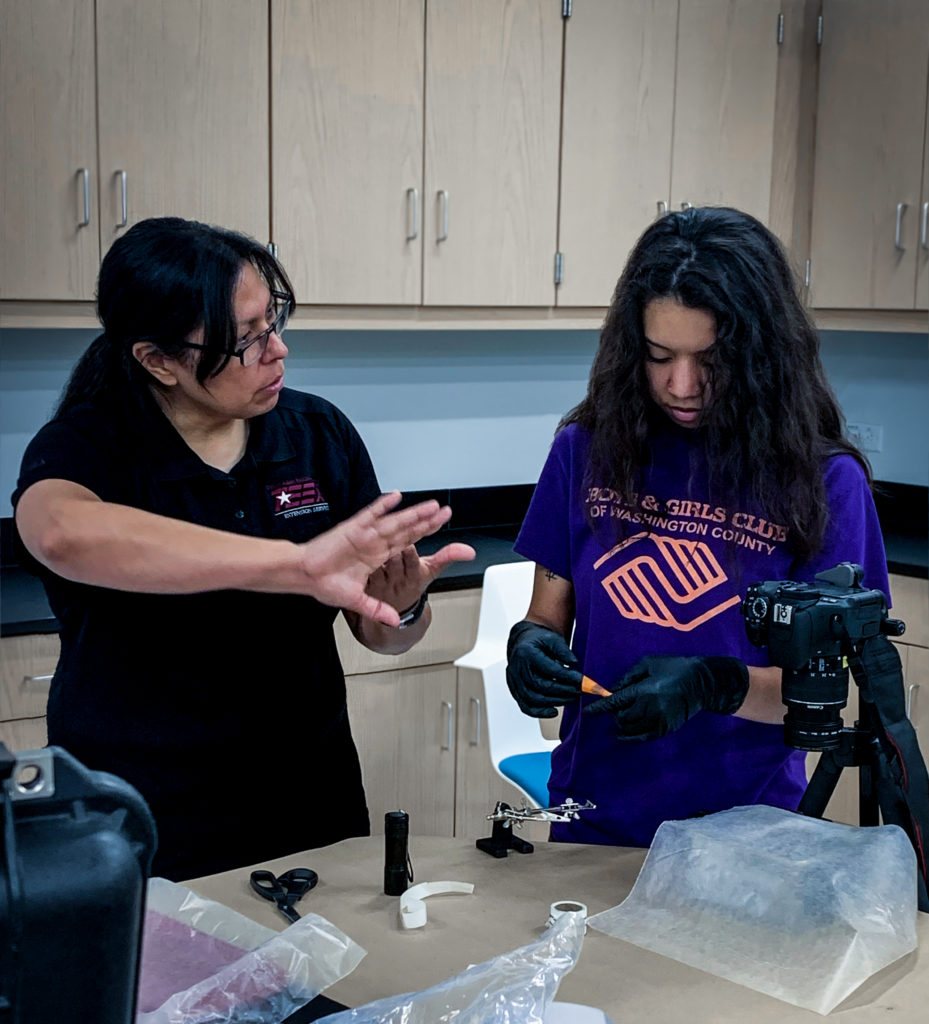Building Crime Scene Investigators One College Student at a Time

In a lab full of thousands of dollars of scientific equipment, Christine Ramirez shows her fingerprint processing class a makeshift fuming chamber she constructed from an old aquarium, a Mr. Coffee mug warmer, a foil baking tin, and a grate from a grill. Ramirez cobbled together these items to create an environment to stabilize fingerprints, increasing the probability that a crime scene investigator will be able to develop the print. But why do this in a lab that has professional-grade fuming chambers? Although this class takes place in a high-tech lab, many crime scene investigators don’t have access to such facilities, and Ramirez wants students to know that with a little money and a lot of innovation, they can always do the work.
This anecdote illustrates some of the life lessons learned in the Collegiate Technical Investigation Skills Program (CTISP) beyond crime scene investigation. The CTISP is a partnership between Blinn College and TEEX’s Texas Forensic Science Academy that provides college students with 272 hours of training in forensic photography, crime scene investigation, latent fingerprint processing, DNA evidence collection and more. In just one semester, students earn 18 hours of college credit and a Forensic Investigation & Evidence Management Professional certificate that allows them to work as crime scene investigators.
More than CSI lessons, students learn adaptability, innovation, precision and confidence. Current student Martha Castillo describes how the program has changed her, saying, “Before this, I didn’t know if I could get a job as a CSI because I’m shy, but that feeling has worn off. The instructors are so positive that it made me more confident and a better person.” Instructors push Martha and her classmates to think creatively and push boundaries, challenging them to complete increasingly complex tasks each week. Ramirez, Program Training Manager, explains, “The mindset here is that you can do this. Not only can you, but if you’re going to do this job, you must. I push them because I want them to do the things that others think can’t be done.”
Beyond adaptability and confidence, the program gives future CSIs hands-on experience, something not often seen in forensics training. Each week brings something new. One week, the class works in a lab with powders and fuming chambers to develop fingerprints on plastic Easter eggs, lightbulbs and other curved surfaces. Another week, students investigate, measure, sketch, photograph, collect and bag evidence in staged crime scenes of scattered clothing and mannequin body parts. At the end of each week-long class, students create portfolios displaying their work. Training Coordinator Michael Clark explains the unique nature of the program, saying, “Collegiate programs often teach the theory behind the science, but we built our entire program on project-based learning. We want students to do these things, so we know that when they go out into the field, they have the experience.”
This hands-on experience benefits both the students and the departments that hire them. On average, it would take three to five years for departments to send employees to receive this level of training. CTISP students pay a fraction of the cost and receive the same credentials as a forensic investigator in just one semester.
Not only do students receive hands-on practice, but they learn firsthand from instructors who worked as CSIs. Program instructors know what it takes to thrive in the field, as all of them have more than ten years of CSI experience. Clark explains, “Courses are taught by practitioners, by people who have done this job for a long time. That adds a lot of value because we share real-world experiences with students.” In addition to telling stories about what it’s really like to be a CSI, all the instructors tell students they can call any time in the future if they need advice about a scene.
It is this dedication to students and the profession that shines through in conversations with Ramirez and Clark. Ramirez recalls that when she was a CSI, a friend asked what profession she would choose if she could do anything forever. Ramirez responded, “I love my job, but if I had to choose one thing to do, I would build crime scene investigators. I’ve been doing this long enough to know what skills they need. I would build CSIs.” In the end, for Ramirez and Clark, “CSI Builders,” life coaches, instructors or whatever you call them, it’s about training the next generation of crime scene investigators and preparing them to serve their communities.
For more information about the Collegiate Technical Investigation Skills Program, please visit https://teex.org/class/fiv150/. To find out more about the Texas Forensic Science Academy, see https://teex.org/program/forensics/.
